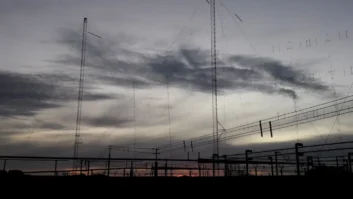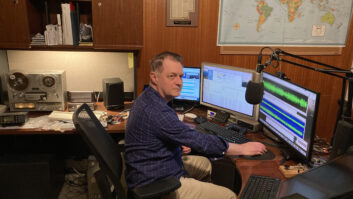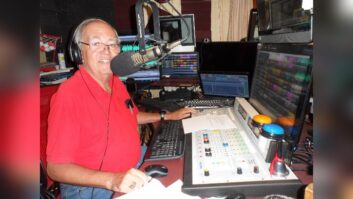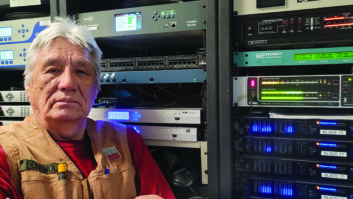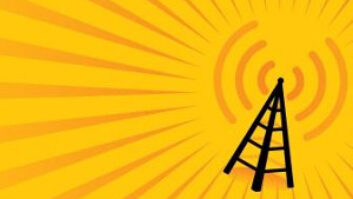For as long as I can remember I’ve been passionate about radio.
From my earliest childhood memories in the 1980s during those final fading days of the Cold War — of my dad tuning in WWV in Fort Collins, Colo., on his dad’s vintage RCA 6K3; of falling asleep listening to my then-old-fashioned AM transistor radio; and of drinking in all those mysterious DX stations I heard over shortwave and medium-wave … I was the sort of kid (a throwback to a former generation, one might say) who couldn’t get enough of radio.
In those days when cable TV and video games and the first PCs upstaged and supplanted radio in nearly every American household, even in the blue collar town in which I grew up, it was nonetheless radio that captured my imagination, and taught me early on that everyone has a story. Radio taught me, too, that each voice is different in his or her consideration of what’s meaningful or newsworthy. I learned to understand or at least appreciate the diverse perspectives I heard in my vicarious radio journeys, and from these sprang my own opinions, hopes, beliefs. Radio became my teacher—a teacher who gave me, in my formative years, a global perspective.
I would have to say that radio has shaped my life. I suppose that’s why radio recently has become a mission for me.
Radio, the only link
Today, I am the founder and director of Ears to Our World, a grassroots charitable organization with a simple objective: distributing self-powered world-band radios to schools and communities in the third world, so that kids, not to mention those who teach them, can learn about their world, too.
I want others –– children and young people, especially –– who lack reliable access to information, to have the world of radio within their reach.
More specifically, Ears to Our World works in rural, impoverished and sometimes war-torn or disaster-ravaged parts of the world, places that lack reliable access to electricity –– let alone the Internet –– and where radio often is the only link to the world outside.

Presenting a radio to the principal of G.H.S. Ntumbaw in Cameroon. Wind-up radios are invaluable in places where a set of batteries might cost up to a week’s wages. Photo courtesy Educare Africa The heart of our mission is to allow radio to be used as a tool for education, so we give radios to teachers, who, in turn, use the radios in the classroom and at home to provide real-life, up-to-date feedback about the world around them. Many of our teachers have used radio to teach language skills, social science, basic literacy, music appreciation and much, much more.
Ears to Our World is a budding organization. But through the encouragement of our dear friends at Universal Radio and the extraordinary magnanimity of Eton Corp., who donate our wind-up world-band radios, we are honored to have, in just two years and on a budget of less than $3,500, distributed radios to schools and communities in nine countries on three continents — in Africa, Eastern Europe, Central and South America, and the Caribbean –– as well as to both Haiti and Chile, where the dissemination of information through radio has been life-saving.
How have we done this? Through partnerships with other reputable established non-profit agencies just like us, that already help struggling schools throughout the world, and who believe, as we do, in freedom of and access to information.
Creating these partnerships was an important move: in the very remote regions we serve, extending our assistance demands persistence, financial resources and logistical support, times 10. And often a great deal of patience.
Just shipping radios to other countries usually involves detailed arrangements with national and regional governmental authorities (for example, to waive duties or taxes); once the radios arrive, safely distributing them to these remote areas can also be costly and complex.
Our partner organizations often have laid the groundwork in these regions and have established reliable connections with communities in them. Their need is for resources — like radios.
By working cooperatively with other established organizations, we find we’re able to distribute radios much more cost-effectively, too. In other words, we can operate on a shoestring budget so that donations are used wisely and to their fullest extent.
For example, because of our strong partnerships, money otherwise spent on travel can be put into shipping costs, thus getting more radios to more areas of the world with less donated funds.
So far, our scope is limited only by our financial resources. Yet we’re not simply focusing on expansion; ETOW is establishing strong, lasting bonds with our schools and teachers so as to better serve their needs long term. We endeavor to replace their equipment and batteries as needed.
Simplicity
Radio World readers will have already guessed (of course!) why we use radio instead of, say, computers, for information access.
It is because much of the world does not have the communications infrastructure to support access to the World Wide Web and other dynamic media sources such as digital television, wireless networks or even electric power or phone. Political instability, meanwhile, can undermine even the written word.

A teacher with an ETOW radio in Bor County, Southern Sudan. ‘Radio is simplicity itself,’ author Thomas Witherspoon says. ‘All one needs is a modest yet capable receiver, and one has instant access to local and world media.’ Courtesy Project Education Sudan But radio is simplicity itself. All one needs is a modest yet capable receiver, and one has instant access to local and world media.
So far, every teacher with whom we’ve worked already knows something about radio; indeed, many have an intricate knowledge of broadcast schedules.
But in these places it can take up to an entire week’s wages to pay for a set of batteries. That’s where our wind-up radios become vital; we effectively eliminate this cost, giving them steady access to information.
And the reports we have received back from the field have been overwhelmingly positive: Teachers in rural Cameroon are able to teach current events. Blind children in rural Belize can listen to the outside world and hear music and languages they’ve never heard. A remote community in southern Sudan was able to listen to reports of their burgeoning country’s recent election. Children in Haiti and families in Chile learned where to go to get food and medical care and information about loved ones affected by the quakes.
As fellow radio enthusiasts and broadcasters, you already know that radio is a remarkable tool; allow me to convince you that it is a powerful teaching tool, as well.
Just as radio taught me, and opened my mind, it can teach others. Please join us; we can shape the world of the future. Ask, as I did, how can I help? And spread the word: Tell your family, your friends, your clubs, your community centers, your colleagues, your employees. If you work for a broadcaster, tell them about us. Post us on your blogs. Mention us over the air. Tell everyone you know: In an Internet world, radio lives! Children’s futures are still written on the airwaves.
Listen and learn. It’s a simple idea, but to some young people, it can mean the world. Together, we can make it happen. Want to help us give the gift of radio? Visit earstoourworld.org or write us at P.O. box 3230, Cullowhee, NC 28723. Your personal interest, or that of your local radio club or business, could put radios in a school or village in the most remote corner of the world.
The author is executive director of Ears to Our World, which was profiled in the Wall Street Journal Magazine in May.





